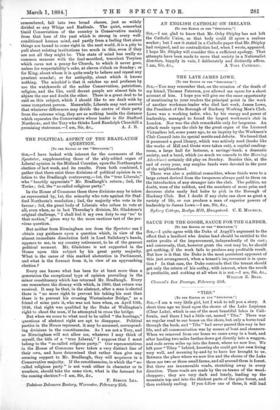THE POLITICAL ASPECT OF THE BRADLA,UGH QUESTION.
[To THE EDITOR OP THE "SPECTATOR."] S111,--I have looked with interest for the comments of the Spectator, supplementing those of the ably-edited organ of
Liberal opinion in the Midland Counties, upon the Northampton election of last week, and its results. From both combined, I gather that there exist three divisions of political opinion in re- lation to the Bradlaugh controversy,-1st, the "true Liberals," who " heartily appreciate " Mr. Bradlaugh's return ; 2nd, the Tories ; 3rd, the "so-called religious party."
In the House of Commons these three divisions may be taken as represented by, 1st, the minority who vote against Sir Staf- ford Northcote's resolution ; 2nd, the majority who vote in its favour ; 3rd, the great body of Liberals who refuse to vote at all, even when, as in last Thursday's division, Mr. Gladstone's -original challenge, " I shall feel it my own duty to say 'no ' to that motion," gives way to the more cautious test of the pre- vious question.
But neither from Birmingham nor from the Spectator can I -obtain any guidance upon a question which, in view of the almost immediate dissolution held in Lord Salisbury's hands, appears to me, in my country retirement, to be of the gravest political moment. Mr. Gladstone is not supported in the ;House upon this subject by his great party majority. What is the cause of this marked abstention in Parliament, and what is the forecast from it, in view of an approaching election ?
Every one knows what has been for at least more than a generation the exceptional type of opinion prevailing in the minor constituency which has returned Mr. Bradlangh. Every one remembers the dismay with which, in 1880, that return was received. It may be that, in the abstract, after a man is elected there is "no more right to prevent bis taking his seat than there is to prevent his crossing Westminster Bridge," as a -friend of mine puts it, who was not born when, on April 10th, 1848, that right was qualified by the Duke of Wellington's right to shoot the man, if he attempted to cross the bridge.
But when we come to what used to be called " the hustings," questions of abstract right are apt to disappear. Political parties in the House represent, it may ba assumed, correspond- ing divisions in the constituencies. As I am not a Tory, and as Birmingham will not allow me, whatever I may think of myself, the title of a "true Liberal," I suppose that I must belong to the " so-called religions party." Our representatives in the House of Commons have taken a very distinct line of their own, and have determined that rather than give any seeming support to Mr. Bradlaugh, they will acquiesce in a -Conservative majority. If the constituencies, in which the " so- called religions party " is not weak either in character or in numbers, should take the same view, what is the forecast for the coming election P-1 am, Sir, &c.,
F. SIHCOX LEA.
Tedetoue Dektmere Rectory, Tirorcester, February 25th.


































 Previous page
Previous page